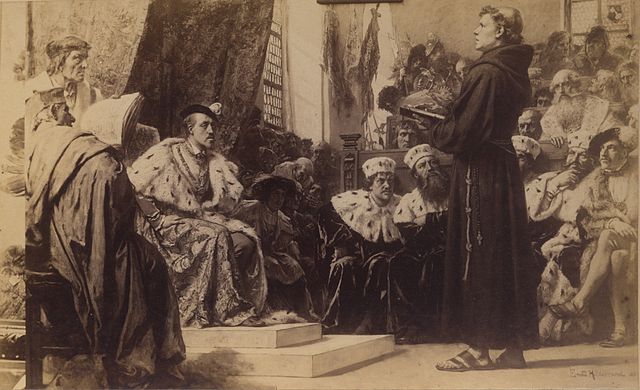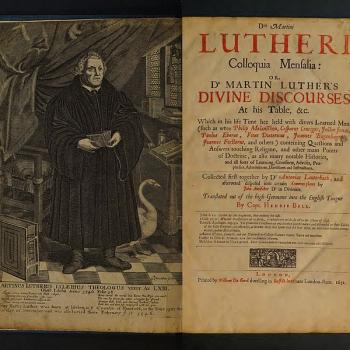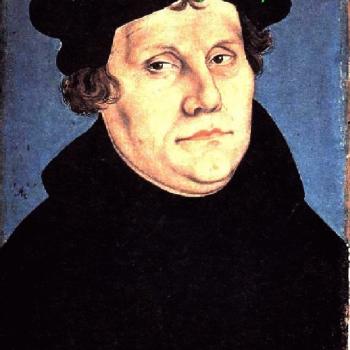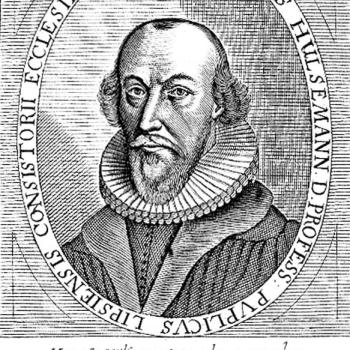+ Luther’s Expressed Obedience to the Pope’s Decision Regarding His Orthodoxy

* * * * *
He didn’t want to leave. He didn’t leave. He was decreed outside the Church by some Papal documents of some sort. He didn’t say “I’m outta here.” [he then cites part of my paper]
Schism: Aversion and Opposition to
Late February 1519 . . . if unfortunately there are such things in Rome as might be improved, there neither is, nor can be any reason that one should tear oneself away from the Church in schism. Rather, the worse things become, the more a man should help and cling to her, for by schism and contempt nothing can be mended. We must not desert God on account of the devil; or abandon the children of God who are still in the Roman communion, because of the multitude of the ungodly. There is no sin, there is no evil that should destroy charity or break the bond of union. For charity can do all things, and to unity nothing is difficult. (1)
5 July 1519 Never have I taken pleasure in any schism whatsoever, nor will I to the end of time. The Bohemians have done wrong in voluntarily separating from our communion, even if they have divine right on their side; for the highest divine right is love and unity of the Spirit. (1)
Asking why he didn’t return doesn’t really make sense in that context. I believe he would have been glad to be un-decreed outside the Church.
The question you should be asking, if Luther believed all this, why then was he decreed outside the Church?
He had left in spirit by departing in the 50 ways I documented above (and all by 1520 before he was ever excommunicated). He had left de facto. The Church merely declared that he had left, de jure [or should that be the other way around? I trust people understand my meaning . . .]
Note also that in several statements documented in my paper noted above, he claimed that he would obey the pope, whether he agreed with his (Luther’s) doctrines or disagreed. But guess what? The pope and the Church disagreed, and Luther broke his own word to the pope, and refused to be obedient and recant his heretical doctrines, as he had claimed that he would. Here are the relevant statements from Luther:
30 May 1518 (Letter to Pope Leo X) Therefore, most holy father, I prostrate myself at your feet, placing myself and all I am and have at your disposal, to be dealt with as you see fit. My cause hangs on the will of your Holiness, by whose verdict I shall either save or lose my life. Come what may, I shall recognise the voice of your Holiness to be that of Christ, speaking through you.
30 May 1518 I expect to receive Christ’s verdict through the Papal throne.
17 October 1518 I humbly implore your Reverence to deign to refer this case to our Most Holy Lord Leo X, that these doubts may be settled by the Church, so that he may either compel a just withdrawal of my propositions or else their just affirmation. I wish only to follow the Church.
7 January 1519 For when I have learned my mistakes, I will gladly withdraw them, and do nothing to impair the honor and power of the Roman Church.
3 March 1519 I testify that I have never wanted, nor do I today want, to touch in any way the authority of the Roman church . . . or demolish it by any craftiness. On the contrary I confess the authority of this church to be supreme over all, and that nothing, be it in heaven or on earth, is to be preferred to it, save the one Jesus Christ who is Lord of all.
5 March 1519 I was never of a mind to desert the Apostolic See . . .
13 March 1519 For although in my disputation with Eck I shall have to dispute the assertion that the Church of Rome is superior to all others, I shall do so with the reservation of full submission and obedience to the Holy See.
30 May 1519 Therefore, Holy Father, I lay my work at your feet in all confidence. Whatever your decision may be, it will in any case have its origin in Jesus, without whom you cannot propose or speak anything. If you condemn my book to be burned, I will say: As it has pleased the Lord, so it has happened. If you command that it be preserved, I will say: Praise be to God! . . . all well-meaning readers may know with what pure intentions I have sought to fathom the nature of ecclesiastical power and what reverence I hold toward the power of the keys. . . . Therefore, Most Holy Father, I cast myself at your feet with all that I am and possess. Raise me up or slay me, summon me hither or thither, approve me or reprove me as you please. I will listen to your voice as the voice of Christ reigning and speaking in you.
13 October 1520 But, to say yet more, even this never entered my heart: toinveigh against the Court of Rome or to dispute at all about her.
17 April 1521 (Diet of Worms) [W]hy may not a worm like me ask to be convicted of error from the prophets and the Gospels? If I am shown my error, I will be the first to throw my books into the fire. I have been reminded of the dissensions which my teaching engenders. I can answer only in the words of the Lord, “I came not to bring peace but a sword.” . . .
[Johann Eck replied and issued a direct challenge:
Your plea to be heard from Scripture is the one always made by heretics. You do nothing but renew the errors of Wyclif and Hus. How will the Jews, how will the Turks, exult to hear Christians discussing whether they have been wrong all these years! Martin, how can you assume that you are the only one to understand the sense of Scripture? Would you put your judgment above that of so many famous men and claim that you know more than they all? You have no right to call into question the most holy orthodox faith, instituted by Christ the perfect lawgiver, proclaimed throughout the world by the apostles, sealed by the red blood of the martyrs, confirmed by the sacred councils, defined by the Church in which all our fathers believed until death and gave to us as an inheritance, and which now we are forbidden by the pope and the emperor to discuss lest there be no end of debate. I ask you, Martin answer candidly and without horns do you or do you not repudiate your books and the errors which they contain?]
Since then Your Majesty and your lordships desire a simple reply, I will answer without horns and without teeth. Unless I am convicted by Scripture and plain reason — I do not accept the authority of popes and councils, for they have contradicted each other — my conscience is captive to the Word of God. I cannot and I will not recant anything, for to go against conscience is neither right nor safe. God help me. Amen. Here I stand, I cannot do otherwise. [Bainton translation]
Roland Bainton (Here I Stand, New York: New American / Mentor, 1950, 139; the above excerpt was on pp. 143-144; Chapter Ten), noted a letter that Luther wrote (to whom is not stated), shortly before the Diet of Worms:
This shall be my recantation at Worms: “Previously I said the pope is the vicar of Christ. I recant. Now I say the pope is the adversary of Christ and the apostle of the Devil.”
James M. Kittelson (Luther the Reformer: The Story of the Man and His Career, Fortress Press, 1986, p. 160) provides another Luther “pre-Worms” utterance along these lines (the online available text didn’t allow access to further source documentation):
I will enter Worms under the banner of Christ against the gates of hell.
Luther literally thought of himself as a “savior” of the Christian Church, according to his letter to Elector Frederick from this period, recorded by a prominent Protestant historian (J.H. Merle D’Aubigne, History of the Reformation of the Sixteenth Century, 1835; translated into English in 1846, Book Seven, Chapter One):
I rejoice with all my heart, most serene Lord, that his imperial majesty desires to summon me before him touching this affair. I call Jesus Christ to witness, that it is the cause of the whole German nation, of the universal Church, of the Christian world. Nay, of God himself……and not of an individual, especially such a one as myself. I am ready to go to Worms, provided I have a safe-conduct, and learned, pious, and impartial judges. I am ready to answer……for it is not from a presumptuous spirit, or to derive any advantage, that I have taught the doctrine with which I am reproached: it is in obedience to my conscience and to my oath as doctor of the Holy Scriptures: it is for the glory of God, for the salvation of the Christian Church, for the good of the German nation, and for the extirpation of so much superstition, abuse, evil, scandal, tyranny, blasphemy, and impiety.
D’Aubigne provides further content of the same letter that Bainton cited above:
The papists do not desire my coming to Worms, but my condemnation and my death. It matters not! Pray, not for me, but for the Word of God. Before my blood has grown cold, thousands of men in the whole world will have become responsible for having shed it! The most holy adversary of Christ, the father, the master, the generalissimo of murderers, insists on its being shed. So be it! Let God’s will be done! Christ will give me his Spirit to overcome these ministers of error. I despise them during my life; I shall triumph over them by my death. They are busy at Worms about compelling me to retract and this shall be my retraction: I said formerly that the pope was Christ’s vicar; now I assert that he is our Lord’s adversary, and the devil’s apostle.
(Ibid., Book Seven, Chapter Six)
Luther’s mind was clearly made up before he even spoke at Worms. Hence he wrote to Cuspianus, the imperial councillor, the day before his famous “Here I stand!” speech:
With Christ’s help, I shall never retract one tittle of my works.
(Ibid., Book Seven, Chapter Eight)
I find this extremely interesting, since the next day in his second appearance at the Diet of Worms Luther played the game of acting like he would retract portions of his books upon questioning from “Scripture and plain reason” that demonstrated any error on his part. He specifically divided his books into many types, implying (one would assume) that he might be willing to retract some portions of them, if persuaded. And he stated flat-out: “If I am shown my error, I will be the first to throw my books into the fire.” How, then, does that jive with his private statement the day before, that he wouldn’t retract anything, not even “one tittle”? It seems pretty evident to me that he had no intention of retracting anything. He simply assumed that no refutation of his works was either forthcoming or possible. Something stinks to high heaven. This sort of equivocation can, sadly, often be found in Luther.
But (getting back to the discussion at hand): this is the Church‘s fault, that the Catholic Church decided Luther held to many heretical doctrines, and he refused to abide by this decision? It is not at all. No religious institution is gonna change 50 things (!!!) just because one guy claims to be an oracle from God. It’s ridiculous to make out that we should do so, and that declaring Luther a heretic is our fault, rather than a simple statement of fact, based on Luther’s freely chosen departures from Catholic orthodoxy. But the myth continues in vigor . . .
Luther sincerely believed all his new doctrines, but he was dead wrong. I locate his primary error not in some terrible sin of pride or rebelliousness, but in utterly sincere erroneous doctrines and theological paradigms (that came from many sources: such as the conciliarists, nominalists, Wycliffites, Hussites, etc.).
Luther’s problem was in his head: not in the “mental” sense, but in the intellectual, “burdened by false premises” sense.
The pope was asking him to lie. To recant what he believed. To say he didn’t believe what he did, in fact, believe. The pope was asking the impossible. “Here I stand. I can do no other.”
I think you would have trouble demonstrating that those 50 things were firmly established as fixed doctrine in 1517. There was no catechism back then. Luther posted 95 theses as an invitation to debate those theses. He wouldn’t have done that if those 50 things were widely known to be fixed doctrine. He would have left straight away if he knew they were not open for discussion.
Those 50 things were firmly established as fixed Roman doctrine later on at Trent.
How is it impossible for a Catholic who claims to be obedient to the Pope and the Catholic Church, to be asked to recant doctrines that are incompatible with said Church?
Luther either meant what he said or he didn’t. If he did, then (following his own statements of adherence to Rome and the pope) he would and should have been glad to recant and retract heresies declared to be such by the Sovereign Pontiff, Supreme Head of the Church. But, alas, he didn’t recant. Instead he refused and started making all kinds of excuses, and obfuscating and engaging in sophistry for why he didn’t do what he said he would do.
The other choice is that he didn’t mean what he said in the first place. This makes him a deliberate liar.
There is a third option, however. Luther meant what he said in these utterances but later changed his mind. But if he did that, it means that he — somewhere along the way — ceased being a Catholic, since a Catholic by definition obeys the pope when corrected on doctrine.
And if he ceased being a Catholic, then the entire point under dispute is conceded: he ceased being so; therefore, how can the Church be at fault for merely declaring what was already a fact (and one that derived from a choice freely made by Luther, under no external compulsion)? And if he wasn’t a Catholic, then why the game-playing (by many Protestants today) of pretending that he was a good Catholic who was unjustly booted out by the Catholic Church?
You act as if we have no doctrines at all that we feel duty-bound to protect. Lutherans don’t act that way. Calvinists don’t; why do you require Catholics to do so?
If you disagree with the 50 items that I documented, then make an argument and we’ll talk about it. How many dissenting opinions are we required to accept? You deny 50 or think that isn’t enough? How about 100? If Luther denied 100 Catholic doctrines (granting this for the sake of argument), would the Church be within her rights to declare him a heretic and excommunicate him?
100 ain’t enough? How about 200? 500? 1000? At what point do we have justification for declaring that a person is not one of us?
What this amounts to is the same old theologically liberal attitude of folks wanting to redefine belief-systems rather than be honest and admit that they believe something differently. Luther ceased being a Catholic in many ways (I showed 50 of them). He also retained several other beliefs (as my new paper shows).
I ceased being a Protestant in October 1990. I didn’t pretend that I still was, when in fact I had come to agree with Catholic teaching. So why should anyone think Luther was still a Catholic in good standing, when the Church determined (by its own criteria of orthodoxy) that he was not?
The Catholic Church is what it is. We couldn’t simply stop on a dime in 1517 or 1520 or 1521 and change the definition and nature and parameters of “Catholic dogma” just because one Augustinian monk demanded that we do so, since God told him he was right and the entire Church wrong.
I obviously disagree with that definition of “a Catholic.” I have not personally been corrected on doctrine by Benedict XVI.
You’re not the one who determines the definition. That’s the point. The Catholic rejects private judgment.
Agreed. And the pope’s judgement is just one private judgement among many.
Not in Catholicism. There is a Tradition that is passed down, and the pope is the premier custodian of it. Luther recognized this in his earlier statements, but he didn’t follow through with the sentiments he himself expressed.
I’m contending that you, a [“Catholic”] Lutheran, cannot define what [Roman] Catholicism is, anymore than I could define what Lutheranism is. Each group determines its own nature and what is and is not in accordance with it.
By the same token, the Catholic Church could decide that Luther was no longer orthodox by its self-consistent definitions. These definitions are in turn determined by history and Tradition, passed down (apostolic succession) and the consensus of the Fathers and Councils and papal declarations, etc.
Martin added a wry comment in the combox:
If you want to belong to the club you gotta pay the dues and play by the club’s rules.
Amazing the people who want the name “Catholic” but don’t want to belong by following the rules.
BTW: Both my father’s line and my mother’s line trace back to Ireland but I prefer you call me Jewish though I hold none of the characteristic beliefs of Judaism.
Related Reading:
***
















